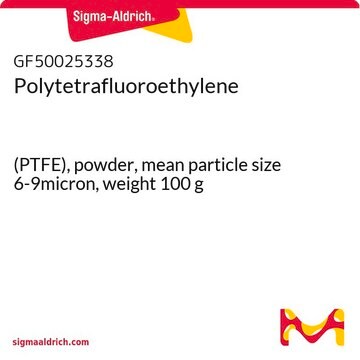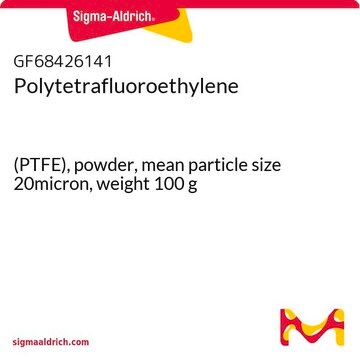GF68759061
Palladium
foil, 25x25mm, thickness 0.125mm, as rolled, 99.95%
Synonym(s):
Palladium, PD000290
Sign Into View Organizational & Contract Pricing
All Photos(2)
About This Item
Linear Formula:
Pd
CAS Number:
Molecular Weight:
106.42
MDL number:
UNSPSC Code:
12141733
PubChem Substance ID:
NACRES:
NA.23
Recommended Products
Assay
99.95%
form
foil
manufacturer/tradename
Goodfellow 687-590-61
resistivity
9.96 μΩ-cm, 20°C
size × thickness
25x25 mm × 0.125 mm
bp
2970 °C (lit.)
mp
1554 °C (lit.)
density
12.02 g/cm3 (lit.)
SMILES string
[Pd]
InChI
1S/Pd
InChI key
KDLHZDBZIXYQEI-UHFFFAOYSA-N
Looking for similar products? Visit Product Comparison Guide
General description
For updated SDS information please visit www.goodfellow.com.
Legal Information
Product of Goodfellow
Storage Class Code
13 - Non Combustible Solids
WGK
nwg
Flash Point(F)
Not applicable
Flash Point(C)
Not applicable
Choose from one of the most recent versions:
Certificates of Analysis (COA)
Lot/Batch Number
Sorry, we don't have COAs for this product available online at this time.
If you need assistance, please contact Customer Support.
Already Own This Product?
Find documentation for the products that you have recently purchased in the Document Library.
Update 1 of: Synthesis and functionalization of indoles through palladium-catalyzed reactions.
Sandro Cacchi et al.
Chemical reviews, 111(5), PR215-PR283 (2011-05-12)
Anton V Dubrovskiy et al.
Combinatorial chemistry & high throughput screening, 15(6), 451-472 (2012-01-26)
The iodocyclization of functionally-substituted alkynes provides an excellent way to prepare a wide range of iodoheterocycles, which can then be readily elaborated through palladium-catalyzed Suzuki-Miyaura, Sonogashira, Heck, Hartwig-Buchwald, and carbonylation processes into libraries of medicinally relevant heterocycles. The synthesis of
Masahiro Toyota
Natural product communications, 8(7), 999-1004 (2013-08-29)
A novel palladium-catalyzed intramolecular oxidative alkylation of unactivated olefins is described. This protocol was devised to solve one of the drawbacks of the original palladium-catalyzed cycloalkenylation that we developed. We call this new procedure the 'second generation palladium-catalyzed cycloalkenylation'. This
Amanda J Hickman et al.
Nature, 484(7393), 177-185 (2012-04-14)
Copper and palladium catalysts are critically important in numerous commercial chemical processes. Improvements in the activity, selectivity and scope of these catalysts could drastically reduce the environmental impact, and increase the sustainability, of chemical reactions. One rapidly developing strategy for
Synthesis of heterocycles via palladium-catalyzed carbonylations.
Xiao-Feng Wu et al.
Chemical reviews, 113(1), 1-35 (2012-10-09)
Our team of scientists has experience in all areas of research including Life Science, Material Science, Chemical Synthesis, Chromatography, Analytical and many others.
Contact Technical Service





